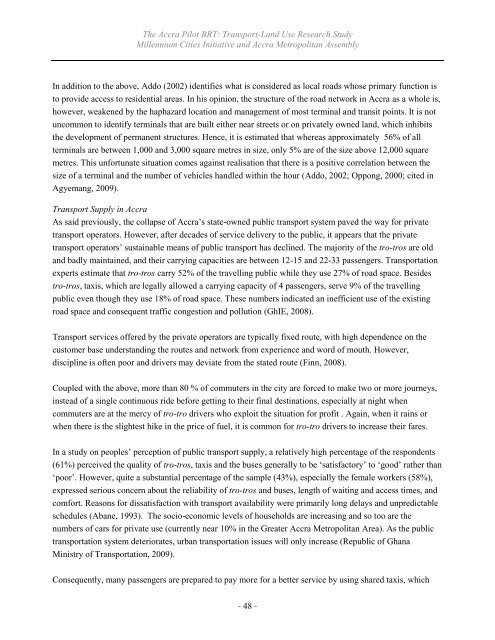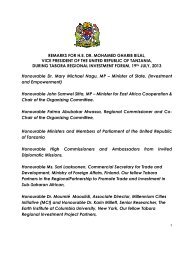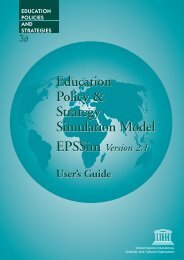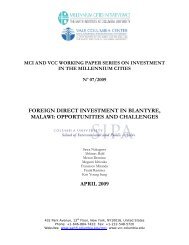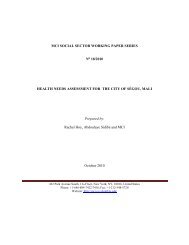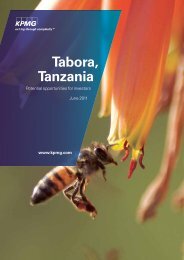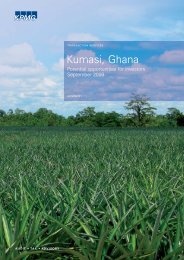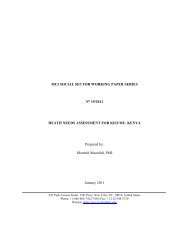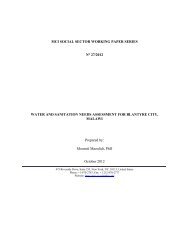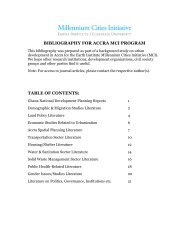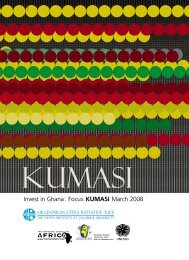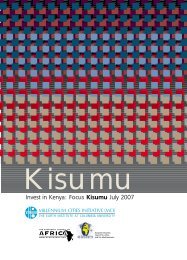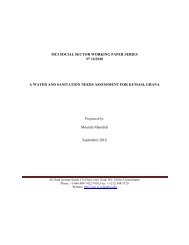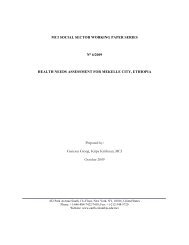Transport-Land Use Research Study - Millennium Cities Initiative ...
Transport-Land Use Research Study - Millennium Cities Initiative ...
Transport-Land Use Research Study - Millennium Cities Initiative ...
Create successful ePaper yourself
Turn your PDF publications into a flip-book with our unique Google optimized e-Paper software.
The Accra Pilot BRT: <strong>Transport</strong>-<strong>Land</strong> <strong>Use</strong> <strong>Research</strong> <strong>Study</strong><br />
<strong>Millennium</strong> <strong>Cities</strong> <strong>Initiative</strong> and Accra Metropolitan Assembly<br />
In addition to the above, Addo (2002) identifies what is considered as local roads whose primary function is<br />
to provide access to residential areas. In his opinion, the structure of the road network in Accra as a whole is,<br />
however, weakened by the haphazard location and management of most terminal and transit points. It is not<br />
uncommon to identify terminals that are built either near streets or on privately owned land, which inhibits<br />
the development of permanent structures. Hence, it is estimated that whereas approximately 56% of all<br />
terminals are between 1,000 and 3,000 square metres in size, only 5% are of the size above 12,000 square<br />
metres. This unfortunate situation comes against realisation that there is a positive correlation between the<br />
size of a terminal and the number of vehicles handled within the hour (Addo, 2002; Oppong, 2000; cited in<br />
Agyemang, 2009).<br />
<strong>Transport</strong> Supply in Accra<br />
As said previously, the collapse of Accra‟s state-owned public transport system paved the way for private<br />
transport operators. However, after decades of service delivery to the public, it appears that the private<br />
transport operators‟ sustainable means of public transport has declined. The majority of the tro-tros are old<br />
and badly maintained, and their carrying capacities are between 12-15 and 22-33 passengers. <strong>Transport</strong>ation<br />
experts estimate that tro-tros carry 52% of the travelling public while they use 27% of road space. Besides<br />
tro-tros, taxis, which are legally allowed a carrying capacity of 4 passengers, serve 9% of the travelling<br />
public even though they use 18% of road space. These numbers indicated an inefficient use of the existing<br />
road space and consequent traffic congestion and pollution (GhIE, 2008).<br />
<strong>Transport</strong> services offered by the private operators are typically fixed route, with high dependence on the<br />
customer base understanding the routes and network from experience and word of mouth. However,<br />
discipline is often poor and drivers may deviate from the stated route (Finn, 2008).<br />
Coupled with the above, more than 80 % of commuters in the city are forced to make two or more journeys,<br />
instead of a single continuous ride before getting to their final destinations, especially at night when<br />
commuters are at the mercy of tro-tro drivers who exploit the situation for profit . Again, when it rains or<br />
when there is the slightest hike in the price of fuel, it is common for tro-tro drivers to increase their fares.<br />
In a study on peoples‟ perception of public transport supply, a relatively high percentage of the respondents<br />
(61%) perceived the quality of tro-tros, taxis and the buses generally to be „satisfactory‟ to „good‟ rather than<br />
„poor‟. However, quite a substantial percentage of the sample (43%), especially the female workers (58%),<br />
expressed serious concern about the reliability of tro-tros and buses, length of waiting and access times, and<br />
comfort. Reasons for dissatisfaction with transport availability were primarily long delays and unpredictable<br />
schedules (Abane, 1993). The socio-economic levels of households are increasing and so too are the<br />
numbers of cars for private use (currently near 10% in the Greater Accra Metropolitan Area). As the public<br />
transportation system deteriorates, urban transportation issues will only increase (Republic of Ghana<br />
Ministry of <strong>Transport</strong>ation, 2009).<br />
Consequently, many passengers are prepared to pay more for a better service by using shared taxis, which<br />
- 48 -


